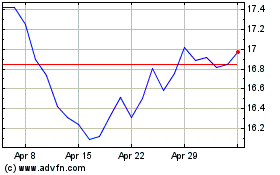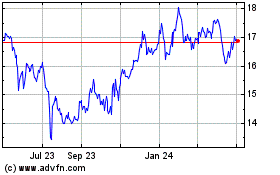Lawmakers Voice Concerns Over AT&T Deal for Time Warner -- 4th Update
December 07 2016 - 5:26PM
Dow Jones News
By John D. McKinnon
The CEOs of AT&T Inc. and Time Warner Inc. on Wednesday
defended their proposed $85 billion merger to skeptical lawmakers,
portraying the union as a bulwark against the dominance of tech
giants while promising new digital media services that will benefit
consumers.
Senators from both parties expressed wide-ranging concerns about
the blockbuster deal at a hearing on Capitol Hill, adding public
pressure on two companies trying to navigate a shifting political
landscape. But no new roadblocks were placed before the
transaction.
The combination -- putting together the country's largest pay-TV
provider with one of biggest content producers -- became a
political lightning rod when it was announced at the height of the
presidential campaign in late October. President-elect Donald Trump
expressed opposition before the deal was even sealed, adding his
voice to the skepticism toward corporate consolidation usually
found on the other side of the aisle.
The deal could lead to "potential anticompetitive favoritism,"
warned Sen. Mike Lee (R., Utah), amid the grilling of the two CEOs
during a hearing that lasted about three hours. The hearing was in
front of the Senate subcommittee on antitrust, competition policy
and consumer rights.
Antitrust enforcers in the Trump administration will ultimately
decide whether to approve the deal or block it as anticompetitive.
However, members of Congress can both reflect and contribute to the
public mood regarding the merger of such large, high-impact
businesses.
Cowen analyst Paul Gallant wrote in research note before the
hearing that "Congress's take on the deal could be more influential
than normal" in this deal review, given that enforcers will have to
balance Mr. Trump's unusual opposition with Republicans' typically
hands-off approach.
Shares of Time Warner, which have been trading at a sharp
discount to AT&T's $107.50 per-share offer amid Wall Street
skepticism, closed Wednesday up 8 cents at $93.98 while AT&T
rose $1.10, or 2.8%, to $40.45.
Sen. Amy Klobuchar (D., Minn), the subcommittee's top Democrat,
also expressed concerns about the deal resulting in higher prices
and less competition.
The worries of the Republican lawmakers were notable.
Mr. Lee, the subcommittee's chairman, said the merger could lead
to price and access problems for competitors seeking Time Warner's
prized content, such as HBO. The senator has previously expressed
skepticism of other deals ranging from Comcast Corp.'s failed
attempt to buy Time Warner Cable and AT&T's nearly $50 billion
acquisition of DirecTV last year.
The Republican also voiced concern about AT&T's practice of
zero rating -- or exempting from data charges -- its new DirecTV
streaming video service. Critics worry that the practice could turn
AT&T into a powerful gatekeeper for consumers' content, he
noted.
The issue came up multiple times in the hearing, including Sen.
Al Franken (D., Minn) questioning how AT&T pays for the
service. The company has defended the practice as legal and good
for consumers, but the Federal Communications Commission has said
it is worried that the practice is anticompetitive.
AT&T Chief Executive Randall Stephenson said the merger
"eliminates no competitor" and that the company aims to "get the
most content to the most people at the lowest prices."
The deal would combine AT&T's pay-TV subscribers and
wireless customers with one of the nation's most prized media
content companies. Time Warner owns HBO as well as the Warner Bros.
studios, plus cable networks including CNN and TNT.
Mr. Stephenson and Time Warner CEO Jeff Bewkes positioned the
deal as a way to increase competition with entrenched
cable-distribution companies, as well as the power of internet
giants like Alphabet Inc.'s Google and Facebook Inc., which
dominate the online advertising space and are pushing into video
services.
Gene Kimmelman, a former Justice Department official and
president of public advocacy group Public Knowledge, stressed that
those internet companies rely on the wireless and broadband
networks controlled by huge telecommunications companies like
AT&T.
Sen. Charles Grassley (R., Iowa) also noted questions about the
merged company's ability to employ "'bullying' tactics to dictate
rates and terms to other networks." Mr. Grassley cited "concern
that this acquisition will concentrate too much power into one
conglomerate," as well as "concern about the merger's implications
for a free and diverse press."
The comment echoed remarks from Mr. Trump in October that the
deal puts "too much concentration of power in the hands of too
few."
Write to John D. McKinnon at john.mckinnon@wsj.com
(END) Dow Jones Newswires
December 07, 2016 17:11 ET (22:11 GMT)
Copyright (c) 2016 Dow Jones & Company, Inc.
AT&T (NYSE:T)
Historical Stock Chart
From Mar 2024 to Apr 2024

AT&T (NYSE:T)
Historical Stock Chart
From Apr 2023 to Apr 2024
